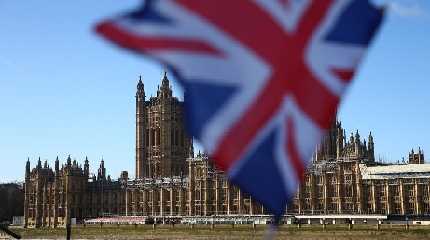
LONDON, Aug. 17 (Xinhua) -- The inflation rate in the United Kingdom (UK) soared to a new 40-year high in July, official data showed Wednesday. Both households and businesses were under mounting pressure and the country's central bank is expected to raise interest rates further.
POOR FAMILIES BEARING BRUNT
The UK's Consumer Prices Index rose by 10.1 percent in the 12 months to July, up from 9.4 percent in June, as rising food prices made the largest upward contribution to the change between June and July, said the Office for National Statistics (ONS).
"Soaring household bills and transport costs remain the biggest headache, holding back discretionary spending across the UK as real incomes continued to fall," said Chief Executive of the British Retail Consortium Helen Dickinson.
Inflation could rise even further in October alongside a widely anticipated huge increase in the energy price cap. The Bank of England has said inflation would jump more than 13 percent in the fourth quarter and remain at very elevated levels throughout much of 2023.
Analysis from charity Citizens Advice showed Wednesday that one in four people in the UK will not be able to afford their energy bills in October, and the figure could jump to one in three people in next January when prices are predicted to soar above 4,200 pounds (5,040 U.S. dollars).
Low-income families could bear the brunt. As they spend more of their budgets on energy, it means inflation experienced by the poorest quintile would rise to 18 percent in October, compared to 11 percent for the richest quintile, said a report by the Institute For Fiscal Studies (IFS) on Monday.
BUSINESSES UNDER PRESSURE
Producer input prices also rose by 22.6 percent in July, said the ONS. Higher-than-expected inflation, alongside energy prices, confirms the severity of the cost-of-doing-business crisis, said Alex Veitch, director of policy and public affairs at the British Chambers of Commerce.
Some businesses in October will face energy bills five times their current price, as concerns over Russian gas supply, tight electricity markets in Europe, and a global disruption to Liquified Natural Gas continue to fuel prices spikes, according to market research firm Cornwall Insight.
With persistently high inflation, retailers could also face a hike in their business rates bill, said Dickinson. "This would impose a cost-nightmare of hundreds of millions of pounds on retailers who are already struggling with razor-thin margins."
For some sectors like UK hospitality, with chronic challenges in the supply chain, labor shortages, interest rates and inflation, rocketing energy prices have become "a matter of existential emergency," said an open letter to the government on Monday.
"Pubs, restaurants, music venues, nightclubs, hotels and wider hospitality have reached the point where the conditions for trading are so prohibitive that many venues are already reducing the hours they open their doors," the letter said.
MORE RATE HIKES EXPECTED
To tackle the worsening cost-of-living crisis, the UK government announced a support package in May, including sending a one-off payment directly to the lowest-income households. But since then, the economic outlook has gotten worse, and the support was considered not enough.
At an aggregate level, the May package would cover three-quarters of the increase in energy costs that were expected then, and to maintain this level of support, given the latest expectations for higher energy prices, it would require an additional 12 billion pounds or so, according to the IFS report.
Research by Ipsos showed Tuesday that two-thirds of Britons say the UK Government is not providing enough support on the cost of living, up from around half who said the same in late May this year.
As inflation reached double digits in July for the first time since 1982, it was also expected to add to pressure for the Bank of England (BoE) to act more decisively. In early August, the central bank said it "will if necessary act forcefully in response" to bring down inflation.
Pressure is on the BoE to raise interest rates by another 50 basis points in September, especially as there is plenty of evidence that inflation is becoming more broad-based, said Tom Pugh, an economist at the business advisory firm RSM UK.




